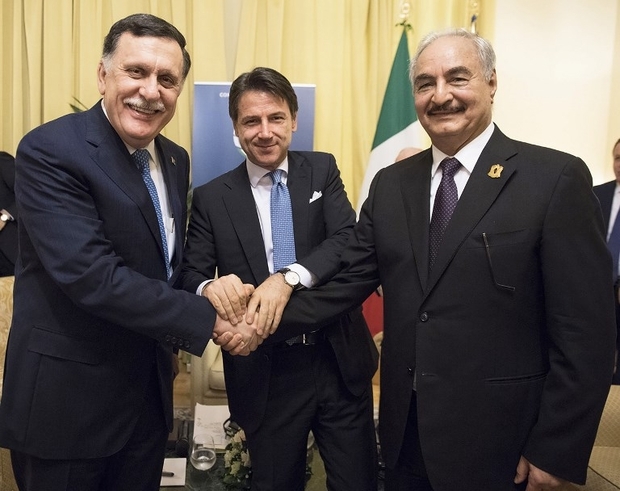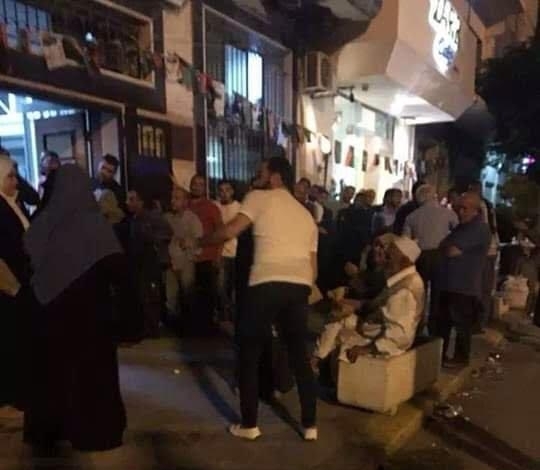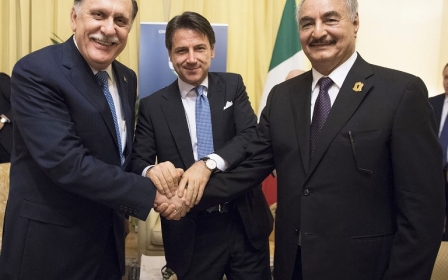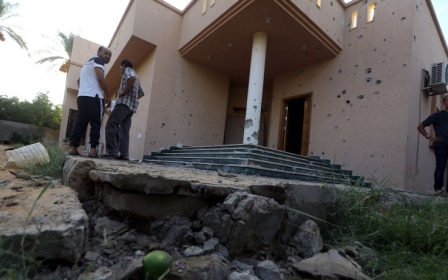While Libyan officials were away, militias came out to pay
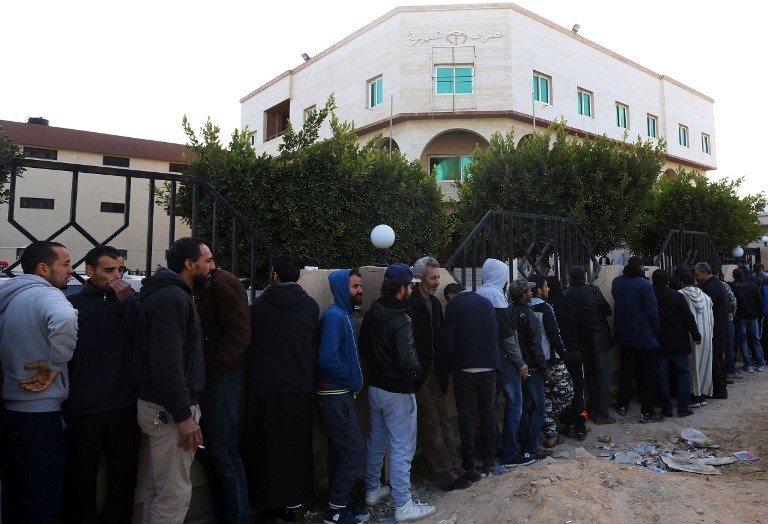
TRIPOLI – With Libyan officials in Italy for a much-anticipated conference this week, one militia in the capital took the opportunity to stir up public support with cold hard cash.
Libyan politicians, including Fayez al-Sarraj, head of the UN-backed Government of National Accord (GNA), and Khalifa Haftar, the self-proclaimed leader ruling much of eastern Libya, gathered in Palermo for the reconciliation conference, hosted by the Italian government.
What did the parades of politicians in recent years in Tunisia, in Paris, in Italy, change for us? Nothing, nothing good for the people
- Zakaria Ali, 21
The event was billed as crisis talks to agree on new political, economic and security measures to stabilise the country - or "a conference for Libya and not on Libya", as Italian Prime Minister Giuseppe Conte put it.
Observers raised doubts about whether much could materialise that went beyond the UN's ongoing efforts in the country, split among rivals since 2011 - and still very much at loggerheads. The conference ended with few steps forward on security and the economy, the main issues facing Libyans.
But back in the capital, with GNA officials away, the Tripoli Revolutionary Brigades took matters into their own hands. Under the watch of its armed militia men, the brigade kept banks in the capital open late into the night, allowing Libyans to withdraw tens times the amount of money normally allowed.
Lines of people snaked in front of the banks as employees distributed thousands of dinars and the militia drew support from a public doubtful about what their leaders were doing in Italy.
"We don’t expect anything from the Palermo conference,” said Zakaria Ali, 21, who stood in line with hundreds of other men waiting to withdraw money. Women stood in a separate line across the street.
He added: “What did the parades of politicians in recent years, all organised in neighbours’ houses, in Tunisia, in Paris, in Italy, change for us? Nothing, nothing good for the people - maybe some results have been achieved by those who suck our gas and oil, but not for us.”
The only solution, he said, was in Libya - and that solution was Haitem.
From warlord to Robin Hood
Haitem is Haitem Tajouri, warlord and leader of the Tripoli Revolutionary Brigades who - following weeks-long clashes in the capital in late September in which his group fought - suddenly changed his public persona.
He is no longer the threatening and fearful head of the most powerful militia in the capital. Rather, he presented himself as a defender of oppressed people. A Robin Hood.
The country’s intense economic crisis has triggered two major armed clashes in recent months. In June, there was fighting in the Oil Crescent, a group of strategic oil ports in the country's east, sparking calls for the UN to block revenues of any oil sold as a result of the aggressions.
And at the end of August in the capital, the Seventh Brigade of Tarhouna attacked a cartel of militias, including the Tripoli Revolutionary Brigades, in what it said was an attempt to "cleanse" Tripoli of the corrupt groups.
The militias, the Seventh Brigade has said, have used their influence to get bank credits worth millions "while ordinary people sleep outside banks to get a few dinars".
Since 2014, the Libyan Central Bank has put strong limits on the supply of foreign currency, which is increasingly necessary for citizens who need to travel for medical treatment now difficult and very expensive to obtain in Libya.
Officially, the bank determines the dinar’s exchange rate, currently set at $1.30, but the country’s vast black market sets a completely different rate, fluctuating between four and seven times higher, according to black market traders. Last year, the rate was 11 times higher.
The gap between the two rates has aggravated basic problems for Libyans in a country torn by political and tribal rivalries, further exacerbated by the personal interests and ambitions of key personalities such as militia leaders.
The price of imports, fuel and primary goods like clothing and food are more expensive. The price of bread has more than doubled in a year, grocers said.
Two sets of rules
But the main problem for Libyans is simply accessing money.
Hussein, a young student standing in the bank line who declined to give his last name to protect his family, said there are two sets of rules to withdraw money today in Libya.
No politician has done something so effective for us before. Why should we trust people in the Palermo Conference when the solution is here between us?
- Abdullah, Libyan waiting in line at the bank
“The official one requires [that you] not withdraw more than 500 dinars a month, about $90 at the black market exchange rate,” he said. “The unofficial one is to give a bribe to the members of the militias that control banks.”
He added: “The militias want their piece of the cake, but it’s ridiculous. They already have all the cake.”
Tripoli is controlled by the Revolutionary Brigades of Tajouri and a powerful Salafi militia, the Special Deterrence Force, also known as RADA, whose head, Abdulraouf Kara, has control of the capital’s airport and a prison where suspected members of the Islamic State group are being held. The militias divide the neighbourhoods and, with them, their respective bank branches.
“If a branch of a bank receives three million dinars, half goes to the militia, the other half is divided between acquaintances and family members, who have to pay a bribe as a sign of gratitude,” Hussein said.
The night watchmen
But the Tripoli Revolutionary Brigades took a further step this week: Tajouri ordered banks in Tripoli to stay open late into the night with men organising the lines of people waiting to make their withdrawals.
He road a motorcycle around the streets adjacent to Martyrs' Square, giving the impression, some said, that he was guarding the rights of the people.
Under his command, Libyans were able to withdraw up to 5,000 dinars - ten times the normal amount - for the first time in years.
Abdullah, another young man in the line, told MEE that he and others from cities and towns more than a hours drive away had come to empty out their accounts while officials were in Palermo.
“They are all here in line because of Haitem. No politician has done something so effective for us before,” he said. “Why should we trust people in the Palermo conference when the solution is here between us?”
“Tajouri is a Libyan among Libyans,” he hooted, as boys and men clapped their hands, shaking their heads in agreement. “Haitem is good. Our hero,” some said.
Even before the conference, brigade members raided Souq al-Mushir, an area busy with foreign exchange trading, according to local newpaper accounts.
Several of the traders had disobeyed Tajouri’s order to lower the price of the dollar. The militiamen forced them to lay down in the street in front of customers and passerbys and then walk with their heads covered by garbage bins.
'Every change hides a scam'
As the sun set on Martyrs' Square earlier that evening, the light from the bank, still open, filled the night as a line of eager customers continued to wait.
Uniformed employees of the GNA's Ministry of the Interior, responsible for protecting the square, were present, along with militiamen, guns in their pockets and three Mercedes parked in front of them, watching over the bank. None of the people in line asked the men in uniform for help or permission, but rather deferred to the militiamen.
"Libya is a country of masks,” he said, holding a bag of fruit in one hand, and a little bread in the other.
"There is no doubt that things are changing, but every change hides a trap. Any reform hides a scam."
Two months ago, Sarraj's government issued two important reforms. The first has seen the creation of new security forces with the aim of reducing the power of militias, and the second is a 180 percent fee on foreign currency purchase transactions.
They might be reforms in name, but Mahmoud has his doubts.
On 25 October, during the inauguration of the new security assessment issued by Sarraj to limit the power of the militias, Haitem Tajouri was present in front of men in uniform.
"They pretended to dissolve two militias, the Nawasi and the Gheniwa [two militias in the same coalition as the brigade], but the truth is that they were absorbed by the Ministry of the Interior,” said Mahmoud. “It’s not a solution. It’s a trick.”
One especially problematic trick used by militias, he said, is to force banks to issues letters of credit to them: “[It] is the perfect fraud of militias and the reforms of Sarraj are likely to institutionalise their thievery.
“The militias have understood the game,” he said. “Some of them change uniforms - wear the official uniforms of the security forces and put their hands on the wealth of the country from within. Others still control the streets."
This article is available in French on Middle East Eye French edition.
Middle East Eye propose une couverture et une analyse indépendantes et incomparables du Moyen-Orient, de l’Afrique du Nord et d’autres régions du monde. Pour en savoir plus sur la reprise de ce contenu et les frais qui s’appliquent, veuillez remplir ce formulaire [en anglais]. Pour en savoir plus sur MEE, cliquez ici [en anglais].


